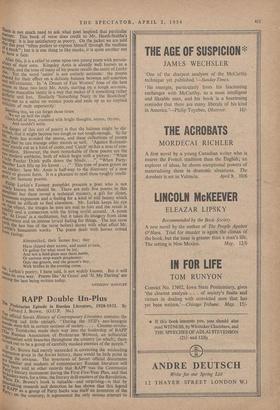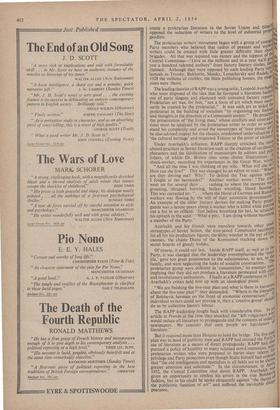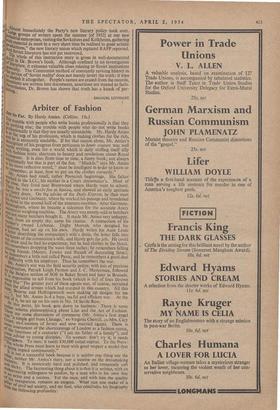P roletarian Episode in Russian Literature, 1928-1932. By Edward J. Brown.
(O.U.P. 36s.) rot °frt. eial Soviet History of Contemporary Literature contains the tilc,„",‘,v'ng sad little epitaph. "During the 1920's neo-bourgois ti "us were felt in certain sections of society. . . . Counter-revolu- 41!;10Y Trotskyites made their way into the leadership of RAPP' orr,e RUssian Association of Proletarian Writers), an influential tu?'„anisation branches throughout the country [in which], there turned out to beta group of carefully masked enemies of the people." If t, create a proletarian literature in the Soviet Union and bitteri) opposed the reduction of writers to the level of industrial 'prOP gandists. • • • The proletarian writers' movement began with a group of younger Party members who believed that cadres of peasant and workrr writers could be created with little greater difficulty than shoe! brigades. All that was required was money and the support of 01° Central Committee—"Give us the millions and in a year we'll gi‘e you a hundred talented authors" from factory literary circles, claimed. Although they were opposed by such leading Party inte‘ „ lectuals as Trotsky, Bukharin, Maisky, Lunacharsky and Radek, °I 1928 the millions of roubles, the State publishing houses, the mag°' zines were theirs.
The leading theorist of RAPP was a young critic, Leopold Averbalthj who soon disposed of the idea that he favoured a literature hacked out of party slogans and plastered with animated factory reports. Proletarian art was, for him, "not a form of art which must neee,s. sarily be created by the proletariat." It was such art as aided the proletariat in the building of socialism "by organising our feelial and thoughts in the direction of a Communist society." He preache the presentation of 'the living man,' whose conflicts and contradie" tions must be analysed by the proletarian writer in order to under; stand his complexity and avoid the stereotypes of ' bare poster art' he also advised respect for the classics, condemned undervaluation 01 'the cultural heritage' and respected Tolstoy to the point of idolatrY.
Under Averbakh's influence, RAPP sharply criticised the 1110 .° absurd practices in Soviet literature such as the creation of cardboa characters and the falsification of manuscripts by editors and pUA tr ushers, of which Dr. Brown cites some choice illustrations. In shock-worker, recording his experiences in the Great War, wrote; ir "And all the time I was thinking of Dry wife. What will she d°' How can she live?" This was changed by an editor to read: "Where are they driving me? Why? To defend the Tsar against w110,", I fought at the barricades?" Another worker wrote: "The tra7 went on for several days . . . rushing to where the cannons wel,', groaning, shrapnel bursting, bullets whistling, blood flowing' This was corrected to: "... where the blood of German and Russia!n workers was flowing by the will of their autocratic governments: An example of the sillier literary devices for making Party prop" ganda was a heroic poem about a worker who is killed while putting out a fire in an oilfield. Just before breathing his last, he scratehe,, his epitaph in the sand: "What a pity. Jam dying without beconli" a member of the Party." Averbakh and his friends were merciless towards other stock stereotypes of Soviet fiction, the iron-jawed Communist sacrificial his all for his production figures, the filthy wrecker in the pay of f°,11, enemies, the chaste Diana of the Komsomol tracking down ta" secret hoards of greedy kulaks. Of course, it could not last. Inside RAPP itself, as well as in the, Party, it was charged that the leadership overemphasised the uno. life,' gave too great prominence to the subconscious, to sex, to th: family, and were neglecting the tasks of socialist construction. T.11a, proletarian group were deficient in 'romanticism,' its enemies sal implying that they did not produce a literature permeated with class and revolutionary enthusiasm. Finally at a RAPP conference in 19-" Averbakh's critics held him up with an ideological pistol.
But it required more than Horatio to hold the bridge. The five-Ye s plan was in need of publicity men and RAPP had resisted the WY," use of literature as a means of direct propaganda; RAPP had al° pursued a policy of hostility to many talented non-Communist, 11; proletarian writers who were prepared to barter their talents fo privilege and Party protection even though Stalin himself had ordered_ that "the old intelligentsia and specialists in all fields are to be shell greater attention and solicitude." In the circumstances, in API.„; 1932, the Central Committee shut down RAPP. Averbakh vi,71/ given an opportunity to confess his errors in the true Bolshe":f fashion, but to his credit he spoke eloquently against "the theorY the publicistic function of art” and suffered the inevitable distil? pearance. "We are finishing the five-year plan and what is there in literature about the five-year plan?" they demanded. "Where is the literat011 of Bolshevik heroism on The front of economic construction?" individual writers could not provide it, then a 'creative group' she ° do so by collective literary labour. The RAPP leadership fought back with considerable élan. In all, article in Pravda at the time they attacked the vulgarisers would reduce all literature to propaganda and the contents of today r newspapers. We consider that such people are liquidators ° literature."
invest immediately the Party's new literary policy took over. Ile groups of writers spent the summer [of 1932] at our new strial enterprises, visiting the Sovkohzes and Kolkhozes, gathering material as must in a very short time be realised in great artistic .uctions," the new literary union which replaced RAPP reported. a Soviet literature has not yet recovered.
.e whole of this instructive story is given in well-documented Literature, in Dr. Brown's book. Although confined to an investigation Literature, it exhumes valuable clues relating to Soviet institutions rally. The Communist method of constantly revising history in service of 'Soviet reality' does not merely invert the truth: it tries iovluolish it altogether. People's names are erased from the records, Nevertheless are written into documents, assertions are treated as facts. .evertheless, Dr. Brown has shown that truth has a knack of per- kshog.




















































 Previous page
Previous page